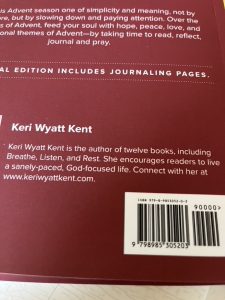This is one in an occasional series on the details of self-publishing.
Writers considering self-publishing often ask if they need to purchase their own ISBN, especially because you can get one for “free” on amazon’s self-publishing platform, Kindle Direct Publishing. The short answer is yes, you should purchase an ISBN for your book, and here’s why. (IMHO)
An ISBN, or International Standard Book Number, is a 13-digit code that identifies your unique book. Since titles are not copyrighted, many books have the same title. For example, I wrote a book titled Breathe. Do you know how many books have the same title? About a billion, it seems like.
According to Bowker, which sells ISBNs in the US and maintains the Books in Print database, “The purpose of the ISBN is to establish and identify one title or edition of a title from one specific publisher and is unique to that edition, allowing for more efficient marketing of products by booksellers, libraries, universities, wholesalers and distributor.” (from myidentifiers.com)
A self-published author’s biggest challenge is distribution, and discoverability. And an ISBN is an essential piece of that puzzle. it protects your book’s rights, and helps retailers and libraries discover your book.

Barcode, ISBN and bio on the back cover of one of my self-published books.
This page explains in more detail why you need an ISBN.
If you are self-publishing, you are the publisher, and therefore you should purchase the ISBN.
If you are working with a “publisher” but you are paying them—you are essentially self-publishing, no matter what label the company puts on it. You’re paying someone to help you do it, but really, you are the publisher. And you should be the owner of the ISBN. If a vanity or hybrid publisher purchases the ISBN, they cannot sell that number or barcode to you, and they have control of your book. They can decide, for example, to take your book out of print. (As can a traditional publisher, but they’ve paid you for that right, and it is fairly simple to buy back your rights should they decide that sales don’t warrant continuing to keep the book in print.)
But a vanity or hybrid publisher may or may not actually be registering your book properly, or even selling you a legit ISBN. Because they are non-transferable, a publishing company cannot sell you an ISBN they have already purchased. (That doesn’t stop some companies from doing it.)
If you are publishing with a traditional royalty publisher, they will purchase the ISBN, because they have purchased the rights to your book (by paying you). So for example, when I did a book with Bethany House publishers, they purchased the ISBN and the rights that go with it. They paid me for the rights to my book. When the book went out of print, I bought back the rights, revised the book, got a new ISBN in my own name, and self-published the new edition of the book.

Back cover, ISBN barcode of a traditionally published book.
If you publish an ebook on amazon, they will offer you an ISBN for “free” but that makes amazon, not you, the publisher of your book. Which means you cannot sell it elsewhere, should you want to do that down the road. Here’s an article that goes more into pros and cons of free ISBNs.
The ISBN is displayed on the copyright page of all books, and the back cover of paperback and hardback books along with a barcode.
You can purchase ISBNs at myidentifiers.com, the website for Bowker, official seller of ISBNs and the keeper of the Books in Print database.
ISBNs cost $125 for one, but $295 for 10. You can purchase them here. Do the math, buying in bulk saves you more than 75 percent. And ISBNs never expire.
But I only have one book. Why do I need 10 ISBNs?
Each edition of your book needs a separate ISBN: so if you publish an ebook, paperback, and audiobook, that’s three separate numbers. If you decide to create an ancillary product like a devotional, you need another.
Also, if you are considering writing and self-publishing at all, I’d suggest you think about your long term goals. If you want to be an author, you should have a long-term plan that includes more than one book.
When I work with clients to help them self-publish, I guide them through setting up an account on myidentifiers.com. They fill in all sorts of information about themselves and their book, including their “company name.” This is the name of their publishing company, or their imprint. You don’t have to incorporate or file taxes under that name to have an imprint. You can simply decide on what you’re going to call your publishing company. Many authors just use their name, or their name plus “Publishing” or “Enterprises” or some other term that sounds vaguely like a business.
That name will show up on your book’s amazon page, so give it some thought. When I self-publish my own books (not clients’ books) I use the imprint name A Powerful Story. When I help clients self-publish, I help them to create their own self-publishing imprint. That name goes on the copyright page and on their book’s amazon page.
At A Powerful Story, we offer assisted self-publishing. We are not the publisher, but a guide who walks beside you, helping you create an excellent product (your book) and set up your own publishing company so that you have complete control and receive all royalties from distributors like IngramSpark or Amazon.

Leave A Comment